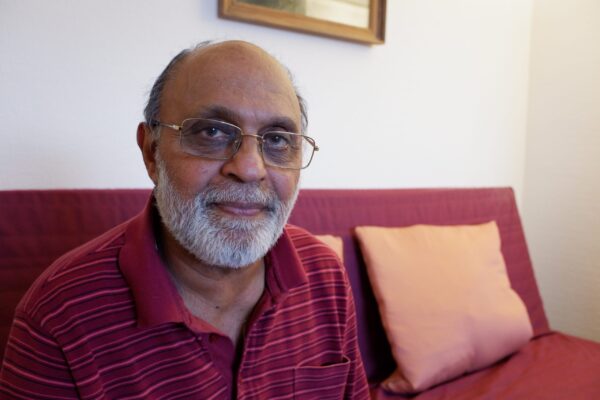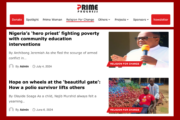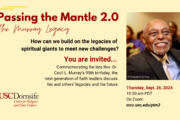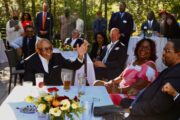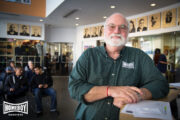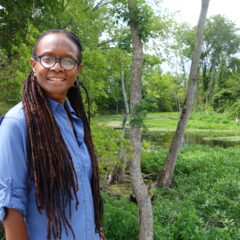This article was originally published in Religion Unplugged, with the support of CRCC’s global project on engaged spirituality.
LONDON — “The environment” is a relatively recent concept. Thomas Carlyle is believed to have first introduced the word to English in 1828, translating Johann Wolfgang von Goethe’s term umgebung to mean “surroundings,” or “circumstances.”
However, only in the mid-20th century, after the physical damage of World War II revealed the earth to be vulnerable, and human effect on it powerful, did the term as we understand it today—not just the surroundings of a particular individual but rather a vast, precarious ecological entity that humans affect—crystallize in public discourse.
For much of our earlier history, you could argue, we didn’t need the term environment. It was intrinsic to us, like the water in which we swam. Often, it was linked to the divine. The world over, the earth was sacred, worshipped by many faith traditions as God’s creation. And while pre-modern societies were not universally magnanimous toward nature, that sense of sacred reverence had the effect of establishing balance and boundaries—boundaries that modernity obliterated.
Today, as the catastrophic effects of global warming and human impact on the planet reveal themselves daily, and as insufficient action threatens the future of our species, what might it mean to revisit such ways of being? To draw on the wisdom of ancient texts and teachings to shift how we relate to the environment, and to steer and ignite change? Such questions lie at the heart of the work of Fazlun Khalid, one of the world’s foremost experts on Islam from an environmental perspective.
A scholar and activist, Khalid has for decades worked to both raise environmental consciousness among Muslims as well as demonstrate, more broadly, the inherently ecological nature of Islam, and the environmental worldview it espouses. In 1994, he founded the Islamic Foundation for Ecology and Environmental Sciences (IFEES), an organization that gathers and interprets Islamic texts that pertain to ecology and formulates educational and conservation projects based on such principles. He has overseen transformational initiatives in Tanzania, Saudi Arabia, Madagascar, Indonesia and elsewhere, and has lectured on Islamic environmentalism at places like the United Nations, Davos and the Vatican, work that has earned him numerous accolades. Nova Science deemed him “the single most active Islamic environmentalist alive today.”
“The ethos of Islam is that it integrates belief with a code of conduct which pays heed to the essence of the natural world,” he writes in his book, Signs On the Earth: Islam, Modernity, and the Climate Crisis, published in 2019. Embedded throughout the Quran, he explains, are notions of conservation, balance, and a sense of responsibility toward the ecosystems we inhabit, even though the modern, secular notion of “environmentalism” doesn’t explicitly appear. “[Islam] proves a holistic approach to existence,” he writes. “It does not differentiate between the sacred and the secular, and neither does it place a distinction between the world of humankind and the world of nature.”
The potential here is a kind of embodied awareness, says Khalid: one might not be told to protect the trees, but rather behave in a way that protects the trees by default, because of an understanding of our place with the natural order of things. Thus, he says, Islamic environmentalism is a tautology. Islam is environmentalism. As the Quran observes, in Surah 40, verse 57, “The creation of the heavens and the earth is far greater than the creation of humankind.”
The Aftermath of Abundance
In Signs on the Earth, Khalid takes a sweeping look at global history and the perils facing the planet, drawing on years of research, observation and practice. Much of the book chronicles the ascent of modernity and the ways in which industrialization and global trade reimagined the world as a banquet of resources that could be controlled and turned into capital. He argues that this transformation of the environment into something commodifiable—and separate from us—frayed our relationship with the Earth by undermining traditional, implicitly ecologically-minded ways of life. “Modernity… has succeeded in corrupting all natural systems that support life,” he writes, “while holding out a promise of progress toward a better future.”
This story, which culminates in the immense and hastening environmental degradation we see today, is damning and familiar. But the book is at its most revelatory when it hones in on Islamic texts and principles, elucidating the ecological ethic embedded in the Quran and the Hadith (the sayings and teachings of the prophet Muhammad). And beyond that, inviting us to consider how the wisdom of ancient teachings and ways of living—Islamic and otherwise—can inform and reframe contemporary behaviors, priorities and systems, on levels both personal and structural.
“Preindustrial societies were biodegradable, and as they died off the forests regenerated and the sands covered their traces,” Khalid asserts. “We are abusing abundance, and it would seem that nothing we do is exempt in our pursuit of a consumer lifestyle that appears to take precedence over everything else. We are in a progress trap.”
At the end of last winter, I visited Khalid at his home in Norwich, a small city near England’s east coast. It was the early days of the pandemic in the U.K., before the first lockdown—that brief period when we had a sense of what might befall us, but before life had really changed. I remember, on the journey from London, feeling for the first time a collective unease. The train attendant asked, “Do you think masks can stop it?” The taxi driver, having just driven a doctor, informing me: “We’re all going to get it.” There “it” was all of a sudden, a shadow-villain, invisible yet unassailable.
Now, it strikes me as well-timed, meeting Khalid in those strange days, to talk about ways of being in the world, and the toll ours has exacted not just on nature, but on our future as a species. The pandemic is waking us up to our relationship with the environment, to our inseparability from it—to the fact that the separation we maintain is a dubious concept. In pursuit of growth, of convenience, of material things, of incorporeal wealth, we had cast aside the fact that we live on a planet, inside delicate ecosystems that can bite back. As we began to adjust our lives to the new presence of the virus, we were also being reminded that despite what we might think and strive for, we aren’t entirely in control. Indeed, a fitting moment to consider how the realm of the sacred could catalyze reorientation on a grand scale.
Rediscovering the Moral Force of Religion
Over the course of a long afternoon, I spoke with Khalid, a soft-spoken man with the formidable presence of a statesman, about his journey into the ecological underpinnings of Islam. He traveled a circuitous path, immigrating to the U.K. from Sri Lanka and winding his way through work with the military, factories and civil service before turning to activism and scholarship.
Khalid was born to a Muslim family in Colombo in the 1930s, when the island was known as Ceylon, and under British colonial rule. Though Islam was part of the fabric of his childhood—he was taught to pray and read the Quran—he wasn’t exposed to a deeper understanding of the faith and the world it envisions. “Religion was reduced to ritual,” he told me. “That’s all the imperial powers would allow us to do.”
He considers that dissociation, between the outer layer of religion and its moral force, to be related to the broader rupture between society and the environment, a fissure which followed from Western colonialism and the rise of industrialization, though that kind of thinking wouldn’t come until much later. In the Colombo of his childhood, as was the norm among the aspiring middle class whether Muslim or Buddhist or Hindu, he attended a Christian missionary school, where he received “a shaded view of the world” and largely felt benignly toward the British occupiers.
“In the afternoons we’d dress up and go to the park, and on Saturdays, we would enjoy the Ceylon Light Infantry, made up of Sri Lankan musicians playing British martial music. These were the colonial tricks they played on us,” he says of the British. “Clever buggers.”
As a teenager, Khalid began to learn how to fly planes, and when he was 20, he and a friend decided to make their way to England and try to join the Royal Air Force. They traveled overland, taking trains through India and Pakistan and hitchhiking across the Middle East and Europe, eventually landing on the shores of southern England in 1953. They went to the nearest city, Brighton, and walked right into the military recruiting office, where they announced to the sergeant behind the desk that they had hitchhiked from Ceylon to enlist. Impressed, the sergeant called in the local newspaper to photograph their travel-worn feet and signed them up right away. Their story made the news and became a bit of a recruiting tool for national servicemen, Khalid recalls. “They said, ‘look at these colonials, they’ve come all this way. What about you, lads?’”
While in the Royal Air Force, events such as the British invasion of the Suez Canal began to awaken Khalid politically and give rise to an anti-imperialist sensibility. After a decade, he left and began working on the floor of a factory for Courtaulds, a large chemical manufacturer in the U.K., alongside a multicultural workforce with large numbers of emigrants from South Asia. Having sidelined his religion and culture during his military years, Khalid was moved to see his Sikh, Hindu and Muslim colleagues practicing their faith in their own way, and began to explore his own relationship with religion, as well as his activist leanings. Eventually he became head of the trade union, dealing with race issues and strikes over working conditions and negotiating demands for wage increases.
Those experiences stoked his interest in systemic change and the immigrant experience in the U.K. and led him to join the government’s Race Relations Board and the Commission for Racial Equality, where for more than two decades he investigated racial discrimination cases across the country. He recalls going into the homes of Caribbean and South Asian immigrants, all of whom were, in the midst of professional and personal hardships, girded by faith.
“There was always a presence of the divine, and that was sustaining,” says Khalid. “Religion was about how to live.”
The idea of religion as not just a set of rituals but a way of being in the world led Khalid toward a politically-charged Islamic community in the U.K., founded by a Scotsman named Ian Dallas. Its members were a mix of feminists, environmentalists and leftists who were vocal about how the modern financial system was tearing up the fabric of society and the natural world.
“These activities,” Khalid writes, “led me to the discovery of a fundamental connection between the nature of money that feeds our current civilization and its ultimate expression, which is responsible for the environmental debacle that is advancing upon us.” In the 1970s and 80s, with the environmental movement gaining steam, Khalid felt compelled to get involved. “I knew things were changing, and changing rapidly: pollution, the destruction of forests, climate change.” But at the time, he says, he didn’t see a specifically Muslim response to the unfolding shifts.
Khalid became curious about what Islam had to say about environmentalism and found it to be an underexplored area. “There was the hint of the existence of an Islamic environmentalism that needed to be expressed in a way that cut through the confusion of our times,” he writes. So, he decided to return to school and pursue a master’s degree at Birmingham University, focusing on just that. As he went about his inquiry, he recalls the thrill of discovery: “I was hardly able to find a page in the Quran that did not mention the cosmos, or the Earth, or the sentient beings that thrived in it, and numerous other aspects of the natural world.” The environmental ethos of the text was utterly clear to him.
From there, Khalid set about figuring out to articulate it, and then, having articulated it, figuring out how to put it into practice, as well as understanding why that sensibility had lapsed in the way Islam was conveyed and practiced. In the years to come, he would turn his body of knowledge into a teaching tool called “Quran, Creation, and Conservation,” form the Islamic Foundation for Ecology and Environmental Sciences, draft the Islamic Declaration on Global Climate Change, and present and speak at fora around the world, activities which have occupied him for the last two decades.
Healing the Fissure Between Humans and Nature
Of course, Islam isn’t the only faith with an environmental consciousness; one could argue that an attentiveness toward and reverence for nature exists across all religions. The issue, says Khalid, is that in our industrialized and money-centered world, in which nature has become something commodifiable, those foundational connections have been reduced to meaningless, often hypocritical rituals, which only exacerbate the gap between our society and our environment. To use an obvious example, much of the world might give a tree pride-of-place in the living room each December, a tradition that grew out of pagan beliefs about the sacred and life-giving power of nature, but the consumerist frenzy that follows rather negates any underlying ecological sensibility.
So how did we get here? Khalid distills the persistent destruction of the environment, even in the face of the immediate threat of global warming and overwhelming scientific warnings, down to two main causes. The first is the loss of a sense of the sacred, which “kept us anchored within the limits of the natural world.” He writes damningly: “We now exist in soulless secularized spaces, concealing the reality that we are all trapped in an irresistible undertow of debt and hedonism aimlessly driving us through oceans of consumerism.” What follows from that is the second cause, which is the disconnection between humans and nature, the notion of nature as something to be conquered, exploited. He quotes environmentalist and writer George Monbiot, who critiques an effort by the U.K. government to put a price on the living world:
The natural capital agenda is the definitive expression of our disengagement from the natural world. First we lose our wildlife and the natural wonders. Then we lose our connections with what remains of life on Earth. Then we lose the words that described what we once knew. Then we call it capital and give it a price. This approach is morally wrong, intellectually vacuous, emotionally alienating, and self-defeating.
Estranged from what nourishes us (via our obsession with value), we seek nourishment from that which estranged us in the first place, increasingly unable to imagine an alternative even as the planet frays before our eyes. And, paradoxically, the more knowledge we accumulate about natural phenomena, the wider the gap seems to be between our society and the natural world, and the less action we seem to take to protect it. “Our civilization, which has ostensibly been built on the scientific paradigm, ignores its own science and the warnings of its own scientists,” writes Khalid.
Given all of this, Islam, he argues, offers ways of thinking about our place on Earth, in relation to other life forms and ecosystems, that could heal these widening fissures and help rebuild a unified rather than antagonistic relationship with the world that houses us.
The concept of fitrah, for example, which is often translated as “original state,” or just “nature,” speaks to the sacred purity of the earth, the ideal natural pattern into which humankind fits. “There’s a simplicity inherent in this message that conveys to us a sense of where we belong,” writes Khalid. It’s a humbling idea, asking us to conceive of ourselves not at the top of a hierarchy, with limitless power and entitlement, but rather within a complex and carefully-balanced order that predates us and will outlast us. From the Quran, 17:37:
Do not strut arrogantly on the earth
You will never split the earth apart
Nor will you ever rival the mountains in stature.
The term ayat, as well, encapsulates how in Islam, the sacred is fundamentally integrated with the natural world. Ayat applies both to internal prayers and natural phenomena; the world itself is an expression of the inseparability of the two. Nature is not divorced from but rather continuous with the human psyche. “We now need to regain that consciousness we once had,” writes Khalid. “An awareness that we are deeply and irrevocably interwoven into [nature’s] fabric and a realization that by causing it grievous bodily harm, we harm ourselves.” If we consider the Earth to be an extension of ourselves, essentially our lifeblood, perhaps we can reappraise our responsibilities toward it rather than continue to blindly engineer our own demise within it.
Khalid also highlights Islamic principles that provide ways of thinking about how our lifestyle and economic systems could be guided by an environmental ethic. The concept of iqtisad, for instance, promotes moderation and simplicity, insisting that “one group or individual cannot take undue advantage over others in the distribution of limited resources.” Zakat necessitates distribution and sharing; relatedly, sadaqah is the voluntary giving of surplus wealth. More broadly, ihsan is about doing what is good or beautiful, and what is good or beautiful as laid out in the Quran is caring for the environment which sustains all life.
From the Hadith, for example:
The world is sweet and verdant
And verily Allah has made you stewards in it
And He sees how you acquit yourselves.
And mizan, the balance principle, articulates how humankind must live in harmony with the rest of creation. Consider verses 55:1-8 from the Quran:
The All-Merciful taught the Quran,
He created man, and taught him clear expression.
The sun and moon both run with precision,
The plants, stars, and the trees all bow down in prostration
He erected heaven and established the balance …
So that you would not exceed the balance.
Of course, the extent to which we have blown past that notion of balance is stark, given how we have altered the climate, poisoned the water and soil, accelerated extinctions of other species, felled the forests… left our mark to such an extent that human impact on the planet has given rise to a new geological era, the Anthropocene.
Framing environmental rules with Islam rather than secular laws
With the enormity of environmental challenges before us now evident and widely accepted, Khalid is committed to exploring how Islam—and its nearly 2 billion followers—can participate in solutions, as previously marginalized faith communities around the world increasingly take up the task. “This crisis should remind Muslims of the deep ecology of their faith,” he writes. For Khalid, catalyzing that consciousness sometimes involves speaking and writing about Islamic principles that might spark environmental sensitivity and new ways of thinking about issues like sustainability and equity, for those inside and outside the faith. In other cases, the work is more targeted, demonstrating to believers how their actions might be at odds with Islamic teachings, and thus prompting specific behavioral changes.
One example Khalid repeatedly cites is his work with a community of fishermen in Zanzibar, who had resorted to dynamiting coral reefs to procure fish, a method which ultimately was destroying the spawning ground of the fish. For years, the World Wildlife Fund had been trying to intervene but to no avail. When Khalid was called in, he brought together the fishermen, community imams and local political leaders for a workshop entirely based on the Quran, in which he illustrated how the faith is rooted in a respect for all life forms and the interconnectedness of humankind and the natural world. Using religious texts, he explained how the fishermen were destroying an entity that nurtured them, destroying Allah’s creation and thus destroying their protector. Within days, the fishermen stopped dynamiting. “The leader said to me, ‘We can break the government’s laws, but we cannot break Allah’s laws,’” Khalid recalls.
He could see, then, that for people of deep faith, framing the importance of conservation and environmental protection in religious terms had a unique impact. It was a way to prompt lasting change, because it spoke to what was already fundamental, rather than something imposed from elsewhere, a Western environmental NGO, say. Instead, conserving the environment became an extension of being a good Muslim, a form of worship. “That was indication to me that I was living the right path,” Khalid told me.
Finding New Frameworks in Sacred Teachings
Perhaps, for people outside the faith, the utility of Islamic principles in furthering environmental consciousness seems far-fetched. But the lesson here is a universal one: lasting change doesn’t happen by decree; rather, it emerges from a reimagining of the framework, to the extent that the change becomes not just appealing, but essential. A sort of inevitable byproduct; a new normal.
Indeed, what Khalid seeks to convey isn’t a singular adherence to Islamic principles, but the broader utility of a holistic approach to the environment; a worldview that espouses interconnectedness and horizontality over power and conquest. He finds this in Islam, though it can certainly be located in diverse spiritual practices. And perhaps this elastic time, which has stretched our understanding of normal and laid bare both our vulnerability and our resilience, has room for ideas like those found in Islam, and across so many sacred realms. Fundamentally, what Khalid believes the sacred provides is space for intuition, for questioning, for fluidity, for feeling. These are qualities that ground us, remind us of our place within the bigger picture, of the vital network of relationships we participate in—qualities that have been stripped away by the “clockwork machine” of modern life.
In this unprecedented moment of flux, of reckoning with what makes our world tick, and at what cost, we might be newly receptive to the ineffability of the spiritual—to its capacity to strike at the heart, on a personal and global scale, and drive us to not just adapt to new ways of being, but actively imagine and reify them. In turn, environmentalism could once again become a concept we no longer need, because it is so foundational, so inseparable from what it means to live.
Read the article on religionunplugged.com.
Meara Priyanka Sharma is a journalist fellow with the Spiritual Exemplars Project.
